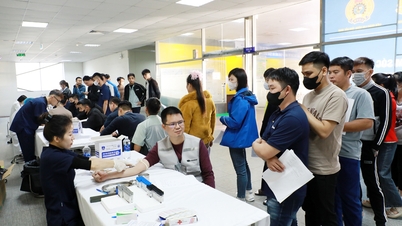Cardiovascular disease is dangerous for many reasons, mainly because it directly affects the heart and blood circulation. The consequences can lead to serious complications, even death. Monitoring for unusual health signs is very important.
People with heart disease need to regularly monitor and have regular health check-ups as recommended by their doctor. The frequency of regular check-ups depends on the severity of the disease and general health status, according to the health website Healthline (USA).

Depending on the severity of cardiovascular disease, the patient may need to have a check-up every 3 to 12 months.
People at high risk or with serious cardiovascular disease should see a doctor at least every 3-6 months. These include people with heart failure, coronary artery disease, or who have had heart surgery or stent placement. Depending on the case, the doctor will request blood tests to check cholesterol and blood sugar, an electrocardiogram, or an echocardiogram.
People with moderate risk factors for heart disease should have regular check-ups every 6-12 months. They should have good control of their blood pressure and cholesterol levels. Doctors will often monitor vital signs such as blood pressure, heart rate, heart function and cholesterol levels.
People with a history of cardiovascular disease but no serious symptoms should have a regular health check-up once a year. These are people with stable health. However, if there are any unusual signs such as chest pain, shortness of breath, prolonged fatigue or leg swelling, they should see a doctor immediately.
Tests are essential to help doctors detect early abnormalities related to the cardiovascular system. In particular, an electrocardiogram (ECG) helps check the electrical activity of the heart and detect abnormal heart rhythms. An echocardiogram will evaluate the structure and function of the heart. Blood tests check cholesterol and blood sugar levels. Blood pressure measurements help assess the risk of stroke and heart failure.
In addition to taking medication and regular health check-ups, heart patients need to maintain a healthy diet by increasing green vegetables, foods rich in omega-3 and avoiding harmful fats.
They also need to exercise regularly at the right intensity. This habit will help improve heart function and reduce stress. Tobacco and alcohol should also be avoided because they increase the risk of high blood pressure and atherosclerosis, according to Healthline.
Source: https://thanhnien.vn/nguoi-mac-benh-tim-mach-nen-kiem-tra-suc-khoe-bao-lau-mot-lan-185250211202645331.htm


![[Photo] 60th Anniversary of the Founding of the Vietnam Association of Photographic Artists](/_next/image?url=https%3A%2F%2Fvphoto.vietnam.vn%2Fthumb%2F1200x675%2Fvietnam%2Fresource%2FIMAGE%2F2025%2F12%2F05%2F1764935864512_a1-bnd-0841-9740-jpg.webp&w=3840&q=75)




![[Photo] National Assembly Chairman Tran Thanh Man attends the VinFuture 2025 Award Ceremony](/_next/image?url=https%3A%2F%2Fvphoto.vietnam.vn%2Fthumb%2F1200x675%2Fvietnam%2Fresource%2FIMAGE%2F2025%2F12%2F05%2F1764951162416_2628509768338816493-6995-jpg.webp&w=3840&q=75)











![[Video] Dong Do Hospital celebrates 15 years of operation](https://vphoto.vietnam.vn/thumb/402x226/vietnam/resource/IMAGE/2025/12/06/1764980267666_img-2287-5359-png.webp)





![[Infographic] Air pollution and recommendations from the Ministry of Health](https://vphoto.vietnam.vn/thumb/402x226/vietnam/resource/IMAGE/2025/12/05/1764950568593_screen-shot-2025-12-05-at-222015-png.webp)























































































Comment (0)